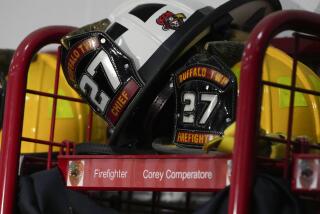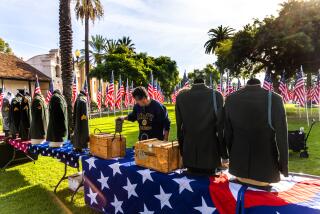‘A native son who has come home’
- Share via
CINCINNATI — The morning sun had barely warmed the grass in the outfield Sunday when the funeral procession turned onto Pete Rose Way, rolling toward the open back gate at Great American Ball Park.
The rumble of the motorcycles filled the downtown streets, a roar loud enough to make the ticket-takers, security officers and ushers -- all of whom worked the funeral for free -- wince.
They had been at the baseball park since 5 a.m. preparing to honor Army Staff Sgt. Keith Matthew Maupin on grounds that traditionally pay homage to a different type of hero. By the time the funeral started eight hours later, the crowd would number in the thousands.
Some of the mourners came to see for themselves that Maupin was finally home. Others came to find something -- a face, a name, an icon -- to help them stay connected to a war that the country appears to be losing interest in.
The search led to a casket atop the pitcher’s mound at the Cincinnati Reds’ ballpark.
It was a long-overdue homecoming. On April 9, 2004, while on a security detail protecting a civilian convoy west of Baghdad, Maupin’s Army unit was attacked and the young soldier abducted.
About three months after his kidnappers released a video of him, another tape claimed to show Maupin, 20, being shot in the back of the head and falling into a grave. The video never showed the soldier’s face.
Maupin’s remains were found last month.
When the time came to bury Maupin -- who was missing in action longer than any soldier in the Iraq war -- it wasn’t just family and friends who stepped up to salute his memory.
Thousands in Union Township and Batavia, Ohio, where Maupin grew up and went to school, lined the streets when his casket arrived Saturday morning. They stood in the cool spring rain for more than an hour, waving flags and wiping tears as the procession made its way to a public viewing.
Boy Scouts and firefighters lined the sidewalks in crisp dress uniforms. Schoolchildren, perched on the shoulders of college students, clung to handmade signs that read “Our Hero” and “Never Forgotten” in bright blue and pink crayon.
On Saturday, and all through the night, thousands waited patiently to see Maupin’s casket during visitation at the Union Township Civic Center. There were still people lined up when the hearse arrived to bring the casket to the ballpark.
Just before 8 a.m. Sunday, the hearse pulled up to the ballpark’s back gate. It entered the beige concrete service tunnel, rolling past a row of golf carts and stocks of grass seed and soil conditioner.
It continued onto the field, stopping near third base.
In the still-empty stands, some of the ballpark’s staff members huddled in the shadows, peering down at the field.
Sunburned popcorn vendors, tiny flags pinned to their sleeves, held baseball caps across their chests as the six military pallbearers carefully lifted the casket.
Security guards bowed their heads, blinking back tears as the pallbearers’ spit-shined black shoes beat a somber tattoo across the black metal stage.
“The war might be forgettable to the rest of the country. Not here,” said Samantha Maloney, 17, a high school senior who usually spends her Sundays hawking soda and hot dogs between innings.
She said she and fellow students at suburban Seton High School began reading books about the war in Iraq this month. The one name her teachers kept mentioning was Maupin’s. They showed his picture in class. His parents came to speak about their son and other troops serving overseas.
“Matt’s kept the war real for us,” Maloney said, referring to Maupin by his familiar nickname. “No one’s been able to forget him.”
By 11 a.m., the gates of the ballpark opened to the public. The crowd swelled.
Veterans, squeezed into old uniforms, saluted the casket and wandered down the aisles to find empty red folding chairs. Others clad in tank tops and shirt sleeves on the warm spring afternoon filled seats along the baselines. As they waited, the conversations turned to Iraq.
How many Americans, some wondered, have died in the war? (As of Sunday, it was 4,052, according to the website icasualties.org.) A few people were quietly critical: They weren’t sure Maupin died for a good cause.
Down on the field, Micah Maupin ignored them.
The sergeant had pictured himself coming home with his big brother, who was his boyhood protector and who inspired him to join the Marine Corps.
The brothers did return together: Micah Maupin flew to the East Coast a few days ago to retrieve the flag-draped coffin.
Standing near the third-base line, ramrod-straight in his dress-blue uniform, Micah Maupin gazed at the stage. A friend patted his arm. A police officer murmured condolences. The clicks of news cameras surrounded him.
He kept glancing at the stage.
Army Sgt. Chase Sterling, a family friend and Matt Maupin’s former commanding officer in the Army Reserve, slipped a hand into one of Micah Maupin’s white-gloved hands.
“You know if you need anything when you’re back in San Diego, you just call me?” said Sterling, who lives in Alameda.
Micah Maupin nodded: “I know.”
The two talked about Micah Maupin’s decision to reenlist. “You’ll try to be safe?” Sterling asked.
His face grew serious. He could be heading to Iraq. His eyes flicked toward the stage.
“I know,” he replied. “I will.”
A few minutes later, the Maupin family walked onto the field.
They were escorted to their seats in front of the casket.
Army Chaplain Jason Logan stepped behind the lectern and took a deep breath. The stadium grew silent. The honor guard, in the visitor’s dugout, quieted their tapping feet on the cleat-scuffed wooden bench.
“Today, we honor a unique soldier. A citizen soldier who left home. . . . “ Logan said. “A native son who has come home.”
--
More to Read
Sign up for Essential California
The most important California stories and recommendations in your inbox every morning.
You may occasionally receive promotional content from the Los Angeles Times.












